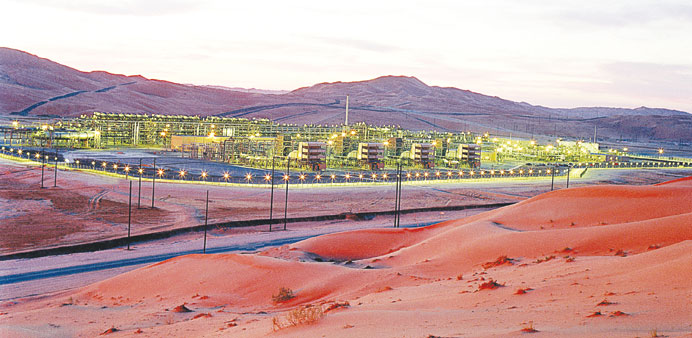Reuters/Dubai
Saudi Arabia has cut oil production substantially, moving to fend off a growing overhang in world oil supply and defend prices well above $100 a barrel.
In the last two months of 2012, Opec’s lead producer responded to slower demand by lowering supply by around 700,000 bpd, with output in December falling to around 9mn bpd, an industry source familiar with Saudi policy said.
That is more than 1mn bpd below peak production last summer. Market sources say the world’s largest exporter may need to drop below the 9mn bpd mark for the first time since May 2011 as rising supply elsewhere outpaces demand.
Core Gulf Opec producers Kuwait and the UAE have shown no inclination to lower supplies, an Opec source said.
News of the Saudi supply curbs helped push Brent up more than dollar to over $113 a barrel, comfortably above the $100 Riyadh says it favours.
Major customers of state oil company Saudi Aramco said the cuts were driven by lower demand.
“It’s nothing sinister. The call on Saudi Arabia’s crude is much less and they are responding to that,” said a major customer of state oil giant Saudi Aramco. “Whatever we ask for, we get - Aramco is not making the cuts.”
The world’s largest oil exporter produced 9.025mn bpd in December, down from 9.49mn bpd in November and 9.72mn in October and over 10mn bpd earlier in the year.
“I think the cut relates to lower domestic consumption and lower demand from overseas customers,” said Paul Tossetti, senior energy adviser at consulting firm PFC Energy.
Up to 500,000 bpd of the reduced Saudi supply is due to the end of peak summer consumption inside the Kingdom, say other industry sources in Saudi. They argue Riyadh may ramp up again, especially if the global economy rebounds.
Record Saudi output last summer helped to cushion the impact of Western sanctions on Iran over its nuclear programme by helping to bring prices down from a 2012 high of $128 in March.
Despite the Saudi reduction, Opec output still looks set to outstrip demand in the first half of 2013.
Opec now is pumping about 30.2mn bpd while forecasts from the group’s economists for the first half indicate demand for its oil of 29.25mn bpd.
Industry sources say Riyadh’s cuts also indicate the Kingdom is in no mood now to battle Iraq, the world’s fastest growing oil exporter, for market share. They suggest Saudi might even have to cut further in the coming months.
“The pressure on Saudi Arabia is not going to go away. There’s going to be more and more oil coming onto the market from places like the US and Iraq,” said a senior oil Western oil executive.
Saudi took an average 126,000 bpd of oil out of storage last month to supply a total of 9.151mn bpd to the market, said the source familiar with Saudi policy.
Latest available data from the Joint Oil Data Initiative shows Saudi crude stocks up from about 230mn bpd a year ago to over 270mn barrels at the end of October.

A view of Saudi Aramco’s Shaybah oil facility at twilight. The world’s largest oil exporter produced 9.025mn bpd in December, down from 9.49mn bpd in
